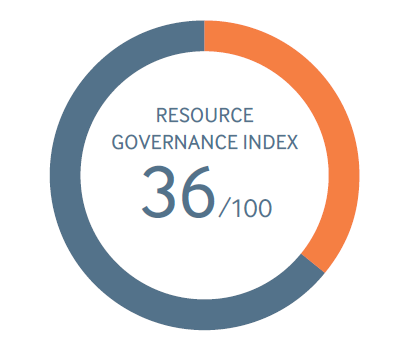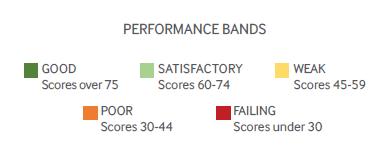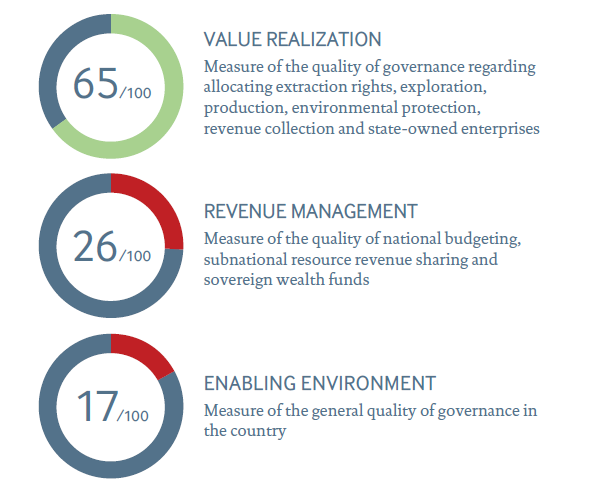
2021 Resource Governance Index: Democratic Republic of Congo (Mining)
Français »
Governance of the mining sector in the Democratic Republic of Congo (DRC) scored 36 points in the 2021 Resource Governance Index (RGI). There had been greater progress between the 2017 RGI and the 2020 Interim Evaluation mainly due to the revision of the Mining Code and Mining Regulations in 2018. The 2021 RGI has revealed that:
- The mining sector in the DRC is characterized by insufficient implementation of mining rules and laws.
- Despite satisfactory improvements in the country’s ability to realize value from the sector, DRC authorities should implement certain rules relating to licensing and publication of the financial interests of public officials.
- Mining revenue management is deficient in the DRC, because the country lacks a consolidated publicly available portal containing information on reserves, production and exports, lacks a numerical fiscal rule and does not implement rules governing the mining fund (FOMIN).
- The enabling environment—the country’s broader governance context—is “failing” and unlikely to support the extractive sector as one that serves the best interests of the state and citizens.
- The hydrocarbons sector is better governed than the mining sector; it is stronger in terms of revenue management and features a smaller “implementation gap.”
NRGI recommends the following courses of action to improve mining sector governance in the DRC:
To the Prime Minister
- Create mechanisms and policies to control corruption in the mining sector and its overall environment.
- Require the regular publication of financial reports of state-owned enterprises.
- Require audits and the publication of audit reports.
- Authorize the National Assembly to monitor the activities of state-owned mining enterprises.
- Introduce a tax rule for the scrutiny of the country’s budgetary operations—expenditure and debt—as is done in Senegal and the Economic \Community of West African States (ECOWAS) area in general.
To the Ministry of Mines
- Require extractive companies to publish environmental studies and environmental impact management plans.
- Enforce the sanctions provided for in law in the event that the aforementioned reports are not published on time.
- Publish quarterly disaggregated statements of payments received by government entities from the various mining
- companies, preferably by project and region.
- Clarify the rules relating to the financial transactions of the mining fund.
- Disclose on the ministry’s website updated mining statistics, disaggregated by mining project and type of
- payment flow.
- Require the disclosure of FOMIN’s financial reports.
- Publish data on the extractive sector’s reserves, production, exports and revenues on one single online portal.
To Gécamines
- Publish audited annual reports.
- Publish project-by-project production and sales data.
- Publish the Gécamines code of conduct.
- Disclose the environmental and social impact studies and the environmental and social management plans for the
- projects in which Gécamines is involved.
- Regularly publish contracts entered into by Gécamines.
To DRC EITI
- Require the publication of contracts and their updates on the EITI and Ministry of Mines websites.


